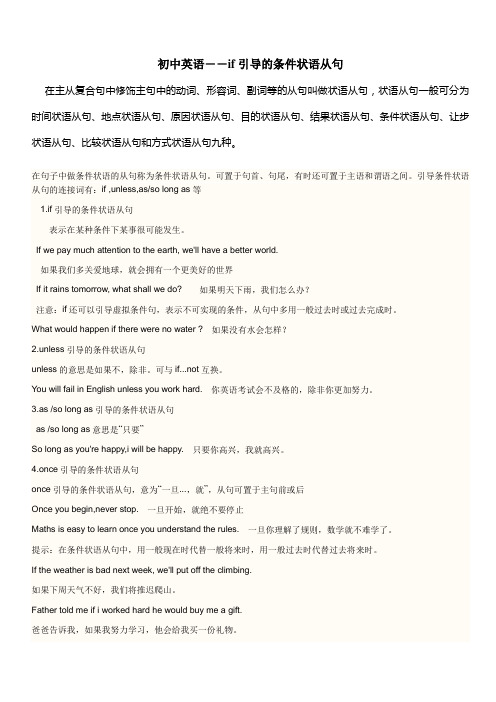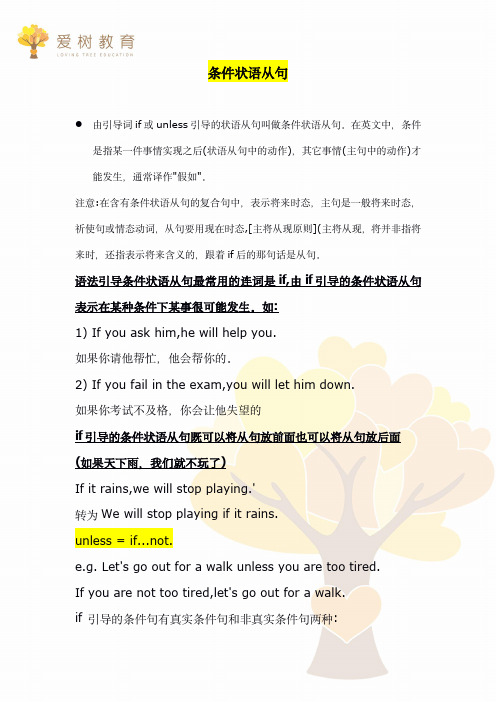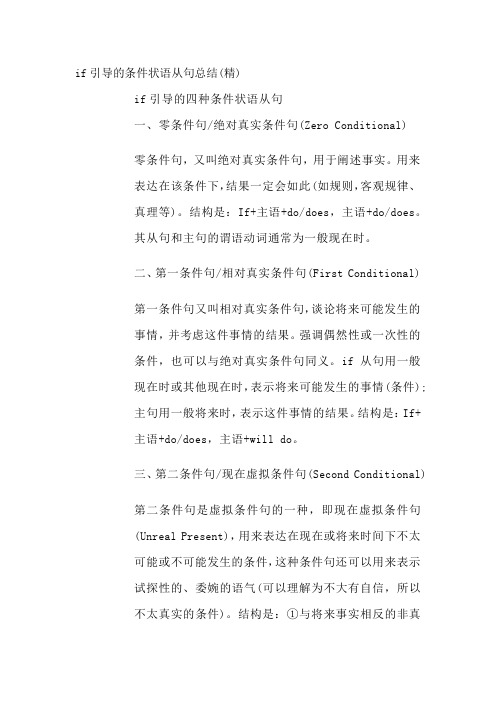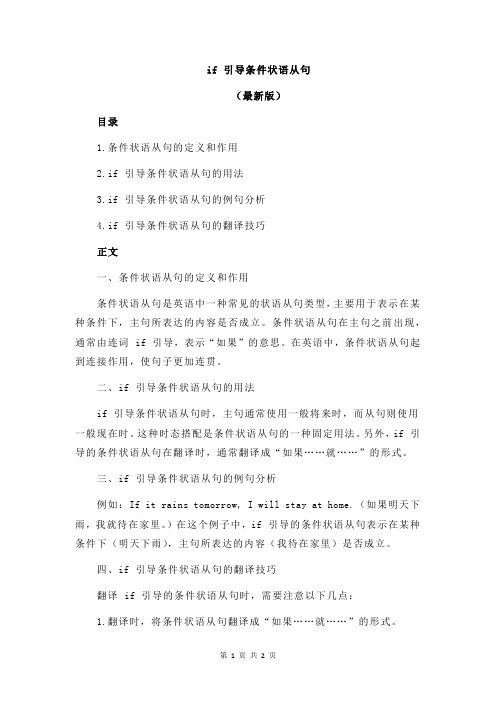总结好的:if引导的条件状语从句
初中英语——If引导的条件状语从句

初中英语――if引导的条件状语从句在主从复合句中修饰主句中的动词、形容词、副词等的从句叫做状语从句,状语从句一般可分为时间状语从句、地点状语从句、原因状语从句、目的状语从句、结果状语从句、条件状语从句、让步状语从句、比较状语从句和方式状语从句九种。
在句子中做条件状语的从句称为条件状语从句。
可置于句首、句尾,有时还可置于主语和谓语之间。
引导条件状语从句的连接词有:if ,unless,as/so long as等1.if引导的条件状语从句表示在某种条件下某事很可能发生。
If we pay much attention to the earth, we'll have a better world.如果我们多关爱地球,就会拥有一个更美好的世界If it rains tomorrow, what shall we do? 如果明天下雨,我们怎么办?注意:if还可以引导虚拟条件句,表示不可实现的条件,从句中多用一般过去时或过去完成时。
What would happen if there were no water ? 如果没有水会怎样?2.unless引导的条件状语从句unless的意思是如果不,除非。
可与if...not互换。
You will fail in English unless you work hard. 你英语考试会不及格的,除非你更加努力。
3.as /so long as引导的条件状语从句as /so long as意思是“只要”So long as you're happy,i will be happy. 只要你高兴,我就高兴。
4.once引导的条件状语从句once引导的条件状语从句,意为“一旦...,就”,从句可置于主句前或后Once you begin,never stop. 一旦开始,就绝不要停止Maths is easy to learn once you understand the rules. 一旦你理解了规则,数学就不难学了。
If 引导的条件状语从句

If 引导的条件状语从句If引导的条件状语从句需要遵循主过从过、主将从现的原则。
例如,如果明天下雨,我就不会去爬山。
如果明天不下雨,我就会和朋友去乡村。
如果你帮我,我就能按时完成。
如果明天天气好,我们可能会出去。
如果你完成了作业,你就可以看电视。
如果你下周日去购物,请给我打电话。
如果我去那里,我会给她带些花。
如果明天下雨,我们会待在家里。
如果他在家,请给我打电话。
如果你更加努力,你就能通过考试。
如果她明天有时间,她会去看望她的爷爷。
如果火车没有准时到达,我们会坐出租车去市区。
如果老师迟到了,他会生气。
除此之外,如果否定形式的if可以转换成肯定形式的unless,例如你如果不努力,你就不能通过考试,可以转换成你除非努力,否则你就不能通过考试。
With your help。
I will be ___.If you wake up early。
you will arrive on time.Wake up early。
or you will be late.If you wake up early。
you won't be late for school.Wake up early。
and you will catch the early bus.1.I will tell you about your friend.Answer: A。
come2.If you go to college。
you will get a good ___. Answer: A。
will get3.I want to know if they will come tomorrow. Answer: B。
will come4.___ exercise。
and you'll be in good health. Answer: D。
and5.If it doesn't rain。
he will play ___.Answer: If it doesn't rain。
if 引导的条件状语从句

条件状语从句由引导词if或unless引导的状语从句叫做条件状语从句。
在英文中,条件是指某一件事情实现之后(状语从句中的动作),其它事情(主句中的动作)才能发生,通常译作"假如"。
注意:在含有条件状语从句的复合句中,表示将来时态,主句是一般将来时态,祈使句或情态动词,从句要用现在时态,[主将从现原则](主将从现,将并非指将来时,还指表示将来含义的,跟着if后的那句话是从句。
语法引导条件状语从句最常用的连词是if,由if引导的条件状语从句表示在某种条件下某事很可能发生。
如:1)If you ask him,he will help you.如果你请他帮忙,他会帮你的。
2)If you fail in the exam,you will let him down.如果你考试不及格,你会让他失望的if引导的条件状语从句既可以将从句放前面也可以将从句放后面(如果天下雨,我们就不玩了)If it rains,we will stop playing.'转为We will stop playing if it rains.unless=if...not.e.g.Let's go out for a walk unless you are too tired.If you are not too tired,let's go out for a walk.if引导的条件句有真实条件句和非真实条件句两种:真实条件句如:If it rains tomorrow,we won't go on a park非真实条件句是虚拟语气的一种,表示与事实相反,如:If I were you,I would go with him.so/as long as只要由as(so)long as,in case引导。
So long as you're happy,it doesn't matter what you do.只要你高兴,你做什么都没有关系。
知识点名:if引导的条件状语从句

知识点名:if引导的条件状语从句讲义:if引导的条件状语从句1. if意为“如果”,引导条件状语从句时,既可放在主句前面,也可放在主句后面。
若if条件句放在句首,从句后面常加逗号与主句隔开。
If you go there, I'll go, too.如果你去那儿,我也会去。
My mother will take me to the park if she is free.如果我妈妈有空,她就会带我去公园。
2. 时态运用:在含有if引导的条件状语从句的主从复合句中,主句为下列情形之一的,条件状语从句通常用一般现在时。
(1) 主句是一般将来时,即遵循“主将从现”的原则。
If he comes, he will bring his violin.如果他来,他就会把他的小提琴带来。
(2) 主句是含有情态动词may/might/can/must/should等的句子。
If you want to lose weight, you must eat less bread.如果你想减肥,你必须少吃面包。
(3) 主句是祈使句。
If you are not strong enough, please don't take part in such an activity.如果你不是很健壮,请不要参加这种活动。
3. 句型转换:(1) 借助“祈使句+and/or+陈述句(一般将来时)”这一句型来转换。
其中,在句意上and表示顺承;or表示转折,意为“否则”。
If you work hard, you'll pass the exam easily.=Work hard, and you'll pass the exam easily.努力学习,你将很容易通过考试。
Work hard, or you won't pass the exam easily.努力学习,否则你不会轻易地通过考试。
if引导的条件状语从句总结(精)

if引导的条件状语从句总结(精)if引导的四种条件状语从句一、零条件句/绝对真实条件句(Zero Conditional)零条件句,又叫绝对真实条件句,用于阐述事实。
用来表达在该条件下,结果一定会如此(如规则,客观规律、真理等)。
结构是:If+主语+do/does,主语+do/does。
其从句和主句的谓语动词通常为一般现在时。
二、第一条件句/相对真实条件句(First Conditional)第一条件句又叫相对真实条件句,谈论将来可能发生的事情,并考虑这件事情的结果。
强调偶然性或一次性的条件,也可以与绝对真实条件句同义。
if从句用一般现在时或其他现在时,表示将来可能发生的事情(条件);主句用一般将来时,表示这件事情的结果。
结构是:If+主语+do/does,主语+will do。
三、第二条件句/现在虚拟条件句(Second Conditional)第二条件句是虚拟条件句的一种,即现在虚拟条件句(Unreal Present),用来表达在现在或将来时间下不太可能或不可能发生的条件,这种条件句还可以用来表示试探性的、委婉的语气(可以理解为不大有自信,所以不太真实的条件)。
结构是:①与将来事实相反的非真实条件句是If+主语+should do/were to do/did,主语+would/should/could/might do;②与现在事实相反的非真实条件句是If+主语+did,主语+would/should/could/might+do。
四、第三条件句/过去虚拟条件句(Third Conditional) 第三条件句是表示与过去事实相反的虚拟语气,是用来表达如果(If)当时那样发生,另外一方面(当时)结果会如何。
通常是指过去的事情,带有一切已经太迟而不能够补救的意思。
结构是:If+主语+had done,主语+would/should/could/ might+have done。
if 条件句的时态搭配1.if从句用一般现在时,主句用一般将来时2.if从句用一般现在时,主句用may/might/canIf the fog gets thicker the plane may/might be diverted.3.if从句用一般现在时,主句用must/shouldIf you want to lose weight you must/should eat less bread.4.if从句用一般现在时,主句用一般现在时5.if从句用现在进行时,主句用一般将来时6.if从句用现在完成时,主句用一般将来时If you have finished dinner I’ll ask the waiter for the bill.。
条件状语从句的归纳总结

条件状语从句的归纳总结条件状语从句是英语中重要且常用的一种从句类型,它用于表示某个动作或情况发生的前提条件。
在句子中,条件状语从句通常由指示条件的连词引导,如:if(如果)、unless(除非)、provided that(倘若)、as long as(只要)等。
本文将对条件状语从句进行归纳总结,并提供常见的应用实例。
一、以if引导的条件状语从句1. 表示真实条件“如果”某个条件成立,就会发生某个结果。
例句1: If it rains tomorrow, we will stay at home.(如果明天下雨,我们会待在家里。
)例句2: If you study hard, you will pass the exam.(如果你努力学习,你会通过考试。
)2. 表示与现在或将来相反的假设“如果”某个条件成立,但事实上并不成立。
例句1: If I were you, I would apologize to her.(如果我是你,我会向她道歉。
)例句2: If I had enough money, I would buy a new car.(如果我有足够的钱,我会买一辆新车。
)3. 表示过去某个假设的结果“如果”过去某个条件成立,就会有相应的结果。
例句: If he had studied harder, he would have passed the exam.(如果他当时学得更努力,他就会通过考试。
)二、以unless引导的条件状语从句unless的意思是“除非”,用于表示某个条件不成立时才会发生某个结果。
例句1: We won't go shopping unless it stops raining.(除非停止下雨,否则我们不会去购物。
)例句2: You won't lose weight unless you exercise regularly.(除非你定期锻炼,否则你无法减肥。
if 引导条件状语从句

if 引导条件状语从句
(最新版)
目录
1.条件状语从句的定义和作用
2.if 引导条件状语从句的用法
3.if 引导条件状语从句的例句分析
4.if 引导条件状语从句的翻译技巧
正文
一、条件状语从句的定义和作用
条件状语从句是英语中一种常见的状语从句类型,主要用于表示在某种条件下,主句所表达的内容是否成立。
条件状语从句在主句之前出现,通常由连词 if 引导,表示“如果”的意思。
在英语中,条件状语从句起到连接作用,使句子更加连贯。
二、if 引导条件状语从句的用法
if 引导条件状语从句时,主句通常使用一般将来时,而从句则使用一般现在时。
这种时态搭配是条件状语从句的一种固定用法。
另外,if 引导的条件状语从句在翻译时,通常翻译成“如果……就……”的形式。
三、if 引导条件状语从句的例句分析
例如:If it rains tomorrow, I will stay at home.(如果明天下雨,我就待在家里。
)在这个例子中,if 引导的条件状语从句表示在某种条件下(明天下雨),主句所表达的内容(我待在家里)是否成立。
四、if 引导条件状语从句的翻译技巧
翻译 if 引导的条件状语从句时,需要注意以下几点:
1.翻译时,将条件状语从句翻译成“如果……就……”的形式。
2.注意时态搭配:主句一般使用一般将来时,从句使用一般现在时。
3.确保翻译的句子通顺、连贯,符合汉语表达习惯。
综上所述,if 引导条件状语从句在英语中起到连接作用,表示在某种条件下,主句所表达的内容是否成立。
If引导的条件状语从句

5. If you __d_o_n_’_t _w_o_rk___(not work ) hard , you _w_o_n_’_t _p_as_s_(not pass) the exam.
6. If she __m__e_n_d_s_(mend) the computer , her father __w_o_n_’t_b_l_am__e_(not blame ).
1.有if引导的条件状语从句的复合句中,当主句和从句的 主语均为you时,可转换为“祈使句,and+简单句”或
“祈使句,or+简单句” You can pass the exam if you work hard. Work hard ----------------,and you will pass the exam.
If you don't hurry up,you will be late again.
or Hurry up,------ you will be late again.
2. 借助介词with 或without来转换。
例如: If you help me, I’ll finish my job soon.
If引导的条件状语从句
潘店镇中学
if引导的条件状语从句
例句:If people obey the traffic rules, →从句 there will be fewer accidents. →主句
if:从属连词,意思是:“如果,假如,倘若”
: 结构
if引导的条件状语从句既可以放在句子前, 也可以放在句子后。
时态:
if引导的条件状语从句, 主句用一般将来时(will),从句用一般现在时。
→主句谓语中也可以含有情态动词, 如:must,can,could,should等
- 1、下载文档前请自行甄别文档内容的完整性,平台不提供额外的编辑、内容补充、找答案等附加服务。
- 2、"仅部分预览"的文档,不可在线预览部分如存在完整性等问题,可反馈申请退款(可完整预览的文档不适用该条件!)。
- 3、如文档侵犯您的权益,请联系客服反馈,我们会尽快为您处理(人工客服工作时间:9:00-18:30)。
if引导的条件状语从句if1) 用法:(1)条件状语从句通常由连词if引导,意为“如果、假如”,主句不能用be going to表示将来,而应该用shall,will。
If you leave now, you are never going to regret it. (错误)If you leave now, you will never regret it. (正确)(2)if “如果”,引导条件状语从句,主句用一般将来时,从句则用一般现在时,如:If it rains tomorrow, I shan’t climb the hills.(3)另外,主句是祈使句或含有情态动词,从句也用一般现在时。
如:Please call me if he comes next Sunday.Can you call the policeman if you are in the trouble.注意宾语从句中的if与条件状语从句if的区别。
宾语从句中的if“是否”相当于whether,引导宾语从句,时态需根据语境确定。
如果主句用一般现在时,从句可以根据具体情况选用时态,如果主句用一般过去时,从句必须用过去式的某种形式。
I don't know if it will rain tomorrow. 我不知道明天是否会下雨。
Our teacher said there was going to be a football match the next month.我们说下月将有场足球比赛。
【边学边做】用括号内所给词的正确形式填空。
1. What will you buy if you ________(have)a lot of money?2. If it ________(not snow)tomorrow, we will feel unhappy.3. You mustn’t go to school if you ________(be)still in bed.4. If he _______(be)at home at that time, he would know it.5. Please show me the way if you ________(know)it.6. You will hurt your teeth if you ________(eat)too much candy.7. If you gave me a toy car, I _________(be)very happy.8. I would get the prize if I _________(work)hard.9.If she ______ (finish ) work early ,she ______(go) home.10.If the weather______(be)fine,we_______(go)for a walk .11. If I_____(have) time tonight ,I _______(finish) the book I’m reading.12. If it ______(rain) next weekend , we_______(not be able to ) plant the vegetable .13. If it_______(rain),we______(stay) at home .14.If she______(arrive) ,she _____(phone) me .15. If he_____(call),tell him I’ll ring back .二、用所给词的适当形式填空1. If you ________(feel) tired, you _________ (have) to have a rest.2. Where _____ he ____(see) the film if he _________(have) time?3. If there ____ (be) fewer trees, there _______ (be) more pollution.4. He ___ (dress) more casually if he ___ (not work) on weekends.5. If Marcia _______ (live) alone, she _______ (keep) a pet parrot.6. Lana _____ (buy) a new dress if the old one ____ (be) out of style.7. The twins _______ (fight) if they__________ (argue).8. I ______ (have) a bake sale if I ____ (need) money for education.9. Peter ____ (send) me a beautiful souvenir if he ____(tour) Spain.10. If Mr. Green _______ (say) I am hard- working, my parents ___ (feel) glad.11. I ______ (go) to the beach if it________ (not rain) this week.12. _____they ___ (have) a match if the P.E. teacher __ (be) busy?13. He ____ (write) a letter to his grandparents if he ____ (get) his report card this week.14. If she ______ (get) up late, she _____ (not catch) the early bus.15. Peter ____ (major) in English if he ____(pass) the exams in Peking University.二、完成句子1. 他如果看电视太久了,他的父母会不高兴。
If he _____ TV too much, his parents ________ ______unhappy.2. 如果明天不下雨,我会和你一起去公园的。
If it _____ ______tomorrow, I _____ go to the park ______you.3. 如果他有空,他会帮助你的。
If he ____ ____, he ______ ____ you.4. 如果Tom考试不及格,他就没有机会上高中了。
Tom ______have the _____to go to the high school if he ________the exams.5. 你如果抄同学的作业就不能学好各门功课。
You _______ _____ good at all the subjects if you ______ the other students’ homework.Module5练习题1.If she goes to a different school, I B. won’t see C. see D. saw2.That’s pity! You play B. such a, such C. such a , so D. so a, such3.My teacher says that if I harder, I do well in my exam.A. don’t, willB. won’t, don’tC. won’t, won’tD. don’t, won’t4.He used to ask strange questions after class. (so // such)5.She has children that she didn’t know what to do. A. so B. such C. so many D. such many6.We won’t go fishing if tomorrow. A. it rains B. it will rain C. it would rain D. it rained7.–Tony, don’t play that kind of joke any more. --Sorry! I do it again.A. won’tB. can’tC. mustn’tD. wouldn’t8.–What are you going to do this summer holiday? –I yet.A. haven’t decidedB. won’t decidedC. have decidedD. didn’t decide9.What (happen) if Steve doesn’t tell his father the truth?10.She says she can finish the book next Monday. A. read B. reading C. to read D. reads11.the day, we were tired but happy.A. At the end of B. By the end of C. At the end D. In the end12.you pass me your dictionary? A. Should B. Could C. Need D. Must13.He knows the computer? A. a lot of, about B. a lot, about C. a lot, of D. a lot of, with14.I’m a student, ?(反义疑问句)15.Everything is ready, ?16.I was doing my homework at the library instead of the shelves.A. tidy upB. to tidy upC. to tidying upD. tidying up17. A rich man worry about his next meal.A. needs not toB. needs notC. need not toD. does not need to三用所给词的正确形式填空18.I think you should offer (pay) for the computer.19.He’ll realize that you are (true) sorry.20.Has Steve told his father the (true)?21.It’s (true) that I play a lot of basketball.22.She (攒钱) a lot of money to buy the shoes.23.But if you aren’t honest, she’ll be even (angry) with you.st week, I was doing my homework at the library instead of (tidy) up the shelves.25.They have warned him about ( not work) hard.26.What (happen) if Steve doesn’t tell his father the truth?27.I’m a student, ?(反义疑问句)28.Everything is ready, ?29 What have her parents warned her (not do)? We shall go for a walk rather than (watch) TV.30 I’d rather (stay) at home than (go) out on such a cold day.31The students were tired after they finished四根据首字母提示完成下列句子1. The doctor w__________ me not to drink too much.2. It's a p_______ that you can't come.3. Please wait until the e______ of this month.4. At the end of the term, we’ll have a f________ exam.5. The thief (贼) broke into the house and s_________ a lot of money.6. Can you m_____ my watch? It doesn't work.7. It will cost at l_______ ten dollars.8. There are many books on those s_________.9. H______ up, or you will be late.直接引语&间接引语引述别人的话时,一般采用两种方式:一是引用别人的原话,把它放在引号内,称为直接引语;二是用自己的话加以转述,被转述的话不放在引号内,称为间接引语。
